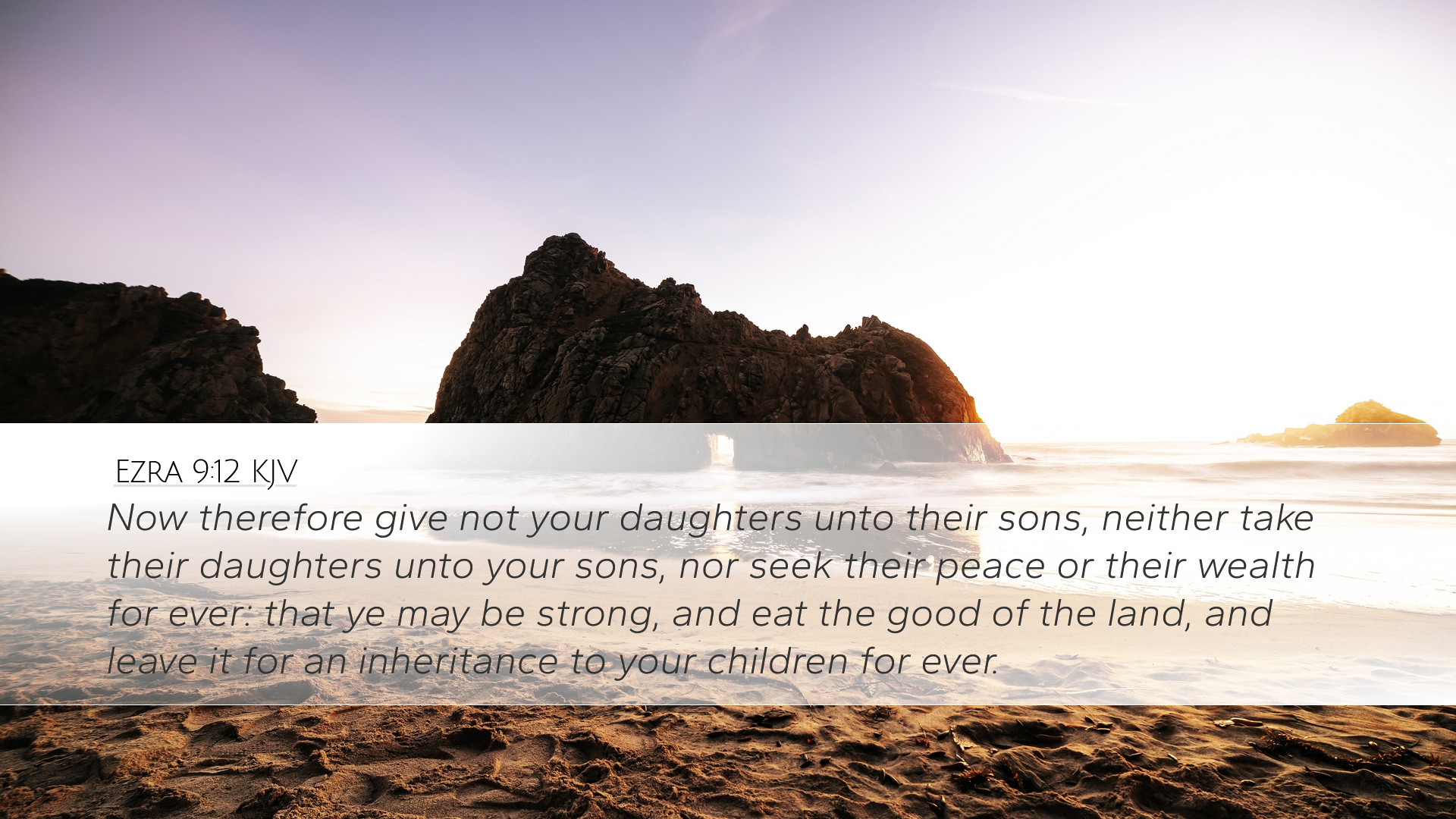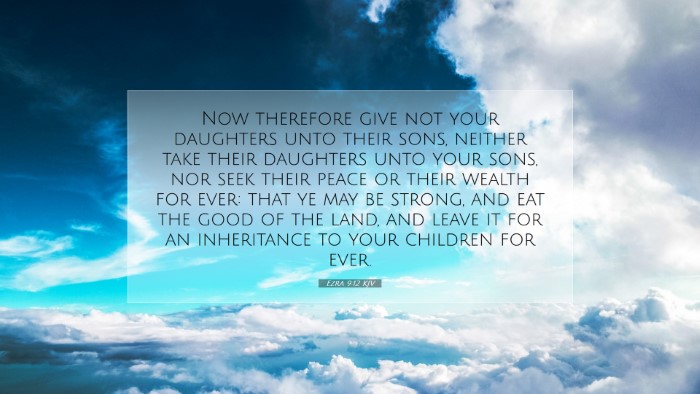Old Testament
Genesis Exodus Leviticus Numbers Deuteronomy Joshua Judges Ruth 1 Samuel 2 Samuel 1 Kings 2 Kings 1 Chronicles 2 Chronicles Ezra Nehemiah Esther Job Psalms Proverbs Ecclesiastes Song of Solomon Isaiah Jeremiah Lamentations Ezekiel Daniel Hosea Joel Amos Obadiah Jonah Micah Nahum Habakkuk Zephaniah Haggai Zechariah MalachiEzra 9:12
Ezra 9:12 KJV
Now therefore give not your daughters unto their sons, neither take their daughters unto your sons, nor seek their peace or their wealth for ever: that ye may be strong, and eat the good of the land, and leave it for an inheritance to your children for ever.
Ezra 9:12 Bible Commentary
Commentary on Ezra 9:12
Scripture Text: "Now therefore give not your daughters unto their sons, neither take their daughters unto your sons, nor seek their peace or their wealth for ever: that ye may be strong, and eat the good of the land, and leave it for an inheritance to your children forever." (Ezra 9:12, KJV)
Introduction
The verse Ezra 9:12 encapsulates a significant exhortation from Ezra concerning the intermarriage between the Israelites and the surrounding nations, which posed a spiritual and cultural threat to the community of Israel. This commentary seeks to provide a comprehensive reflection on this verse, drawing insights from esteemed public domain commentaries.
Historical Context
In the backdrop of the return from Babylonian exile, the Israelites faced the challenge of re-establishing their identity and covenantal relationship with God. Ezra, as a scribe and priest, undertook the task of restoring the Law and guiding the people back to faithfulness. His concern in this chapter revolves around the issue of mixed marriages that could dilute their commitment to Yahweh.
Exegesis of the Text
This verse is packed with significant implications, particularly regarding the covenant community's purity and the relationships Israelites were forming with foreigners. Ezra’s charge reflects both a protective measure for Israel’s spiritual integrity and a directive for socio-economic engagement that aligns with God's commands.
Prohibitions against Intermarriage
Ezra’s command not to give or take daughters in marriage to and from the peoples of the land stems from a deep-rooted understanding of Israel's unique identity as a chosen people. In the commentary of Matthew Henry, he emphasizes the importance of maintaining religious boundaries to protect the faith and morals of God’s people. Such marriages with idolatrous nations would lead to spiritual compromise, a theme echoed throughout the Scripture.
The Importance of Community Integrity
Albert Barnes remarks on how this call to separation was not merely for the sake of separation itself but for the preservation of Israel's heritage and future blessing. By urging the people to refrain from such unions, Ezra was ensuring that the spiritual legacy and cultural practices of Israel would endure through generations.
Seeking Peace and Wealth
Ezra warns against seeking the peace or wealth of these neighboring nations. Adam Clarke notes that the Israelites were tempted to associate with surrounding peoples for practical benefits. However, surrendering to this temptation could lead to a compromise of religious values and an eventual downfall of their community. It's a stark reminder that prosperity built on unholy alliances is not truly blessed by God.
Exhortation to Strength
Ezra concludes with a call to strength and a promise of goodness. He signifies that strength is found in upholding God's commandments. Matthew Henry underlines that obedience leads to the enjoyment of the good things of the land, which signifies God’s blessings. This can also be seen as an encouragement to the community that faithfulness to God results in ample provision.
Theological Implications
From a theological standpoint, this verse can be seen as a reflection of God's covenantal nature. His relationship with Israel was based on exclusivity and holiness. The act of intermarriage symbolizes a breach of that covenant. Albert Barnes explains that the call to avoid such unions is a reminder of the danger of syncretism, where the pure worship of God becomes mixed with foreign influences.
The Principle of Separation
The principle of separation noted in this passage applies not only to marriage but also to various aspects of life. Adam Clarke emphasizes that believers should be vigilant in their relationships and affiliations, ensuring that they remain aligned with God’s kingdom values and do not compromise their spiritual integrity.
Application for Today’s Believers
- Cultural Engagement: Believers today are called to engage with the world but must do so through the lens of Scripture, ensuring that their values and beliefs are not compromised.
- Guarding Community Identity: As Ezra emphasized community purity, contemporary pastors and leaders should encourage practices that build a robust and distinct church identity, rooted in the Gospel.
- Faithful Relationships: The warnings against intermarriage can translate into the need for discernment in all relationships, ensuring they foster spiritual growth, rather than hinder it.
- Seeking God’s Blessing: Practical success in business or personal life should not come at the expense of integrity in one’s faith. The blessings from God are best enjoyed in the context of obedience.
Conclusion
Ezra 9:12 serves as a crucial reminder of the need for spiritual vigilance within the community of faith. This verse encourages modern believers to uphold the integrity of their faith amidst a diverse and often conflicting culture. Drawing from the insights of public domain commentaries, we recognize that the call to separation continues to resonate, urging believers to pursue holy living, cultivate strong faith-based relationships, and remain steadfast in the face of societal pressures.


